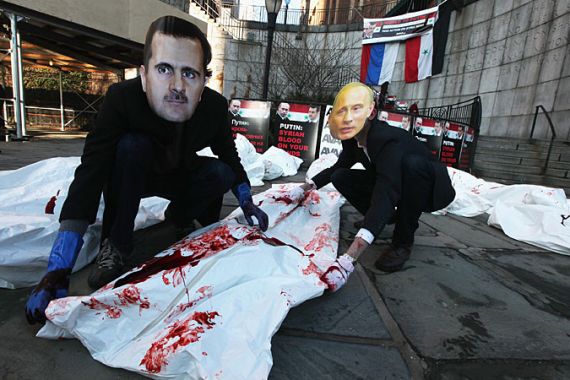
Has Syria been given a licence to kill?
After Russia and China vetoed a UN resolution on Syria, we ask if this is the end of the road for a diplomatic solution.
|
“Russia and China did it out of principle. We see in Syria exactly what happened in Libya. We have a crisis artificially-created, obviously operated by some forces outside Syria. So they provoke the government, they provoke the soldiers into committing atrocities, which no one in Russia supports, and then they impose some kind of UN sanctions and then there is direct intervention. Russia is basically calling for a dialogue as the only way to settle the dispute.” – Dimitry Babich, a staff writer for Russia Profile magazine |
The UN has again failed to condemn the Syrian government for its crackdown on protesters, after Russia and China blocked a Security Council resolution.
For four months, members at the UN have been trying to reach an agreement on a way to stop the violence in Syria.
And for the last few days, diplomats from Arab and Western countries have been working all hours to get an agreement. There were endless negotiations, with the proposed resolution rewritten and redrafted.
Finally it came to a vote on Sunday – 13 in favour and two against.
But the two countries that voted against the resolution – Russia and China – are permanent members of the UN Security Council wielding the power of veto.
Other nations have erupted in fury at the blocking of the peace proposal, employing language that is far from diplomatic.
The US said the vetoes were “shameful” and “unforgivable”, while Britain said the vote “lets the Syrian people down”.
So, what is next for the Arab League after the failure at the UN?
|
“This is not some kind of Western imposition. It’s Syrians themselves on the ground who are requesting that the international community come to their aid. There is also the militarisation of the opposition because Syrians are losing faith in the possibility of peaceful change and that’s why they are arming themselves. Frankly, the UN vote was the best recruiting tool the Free Syria Army could have asked for and I think they are going to be getting a lot more people joining them.” – Shadi Hamid, the director of Brookings Doha Centre |
Back in November, Syria had agreed to an Arab League peace plan, but it ignored deadlines to end the violence and was suspended from the league.
Later that month, the league imposed sanctions on Syria and by December, the government had signed a peace deal and observers were sent in.
Following the observers’ report, the league produced a new plan calling for Bashar al-Assad, the Syrian president, to step down. Soon after that, the monitors’ mission was suspended.
That new league plan strongly influenced the latest resolution prepared for the UN Security Council.
So, has diplomacy reached the end of the road? And has the veto given al-Assad a licence to kill? Following yet another diplomatic failure, what can be done now to resolve the Syrian crisis?
Inside Story, with presenter James Bays, discusses with guests: Dimitry Babich, a staff writer for Russia Profile magazine; Sameer al-Taqi, the director-general of the Orient Research Centre, a former policy advisor to the Syrian government and a former member of the Syrian parliament; and Shadi Hamid, the director of research at the Brookings Doha Centre.
|
“Unfortunately the Russians have committed a big mistake, they have shot themselves in the foot …. They are just pushing things to the extreme. Now Russia is not capable of playing any mediator role between the Syrian opposition and the regime. What’s happening in Syria is exactly what had happened in Russia 20 years ago. We did hope that Russia could play a major role in the mediation that could push the political process even to protect all minorities in Syria.” Sameer al-Taqi, the director-general of the Orient Research Centre |